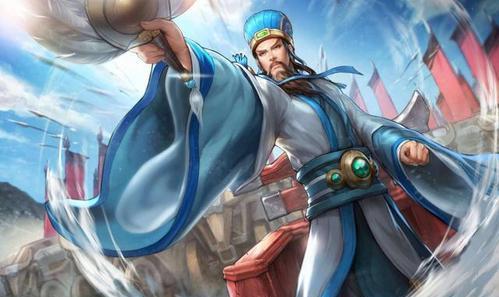Zhuge Liang is a god-like figure in the Romance of the Three Kingdoms, he can qi men and armor, line up troops, astronomical gossip, and even borrow the East Wind, it is such a strange man who suffered defeat in the Battle of the Upper Valley.

The 49th episode of the Romance of the Three Kingdoms depicts Zhuge Liang's practice in the midwinter season, borrowing three days and three nights of southeast wind to help Zhou Yu fire attack the Cao army.
In that story, Zhuge Liang and Zhou Yu jointly formulated a plan to attack Cao Ying by fire. However, for several days, the northwest wind on the river has been blowing, and attacking with fire will not only not burn the Cao soldiers on the north bank, but will burn themselves.
Zhou Yu was sullen about the East Wind and fell ill in bed. After Zhuge Liang knew, he prescribed a prescription to Zhou Yu, and Zhou Yu opened it to see that it said:
If you want to break the Cao soldiers, it is advisable to attack with fire. Everything is ready, only the east wind is owed.
Zhou Yu admitted that his heart was guessed by Zhuge Liang, so he asked Zhuge Liang what he could do. Zhuge Liang then said that he could borrow the East Wind, and he asked Zhou Yu to build a nine-foot-high altar of seven stars for him, and then he practiced it on the altar himself.
Zhuge Liang was familiar with astronomical geography, and by surveying the changes in the landform and organisms, he had already deduced that there was a southeast wind on the twentieth day of November, so he pretended to make a few comparisons on the Altar of the Seven Stars. On November 20, the sky did indeed have an easterly wind.
Zhuge Liang and Zhou Yu jointly planned a brilliant fire attack strategy, and finally a fire burned Cao Cao to abandon his robe and flee, and the fire was reborn, and the pattern of "three divisions of the world" was laid.
Later, during the Northern Expedition, Zhuge Liang has not been successful, in addition to various external factors, but also because he encountered a strong enemy - Sima Yi.
Once, Zhuge Liang and Sima Yi confronted each other in Weishui, and Sima Yi believed that the upper valley must be the "granary" of the Shu army, and in order to break the grain route of the Shu army, he decided to carry out an all-out attack.
Sima Yi, along with his two sons, led the Wei army to the upper valley. Zhuge Liang sent the general Wei Yan to bring Sima Yi's army into the Upper Valley.
The upper valley is also called "Gourd Valley", the entrance is narrow, the hinterland is wide, the two sides are high, the middle is low, shaped like a gourd, but the entrance can only pass through one person and one horse, and After Sima Yi's army entered the upper valley, it was like entering a dead end. He knew he had been deceived, but it was too late.
Zhuge Liang sealed gukou with a small number of troops, and then burned Sima Yi's father and son and the Wei army with a large fire. Sima Yi lamented that all three fathers and sons would die here, and tears fell like rain.
However, at this crucial juncture, heavy rain suddenly fell from the sky, extinguishing the fire in the valley above. Sima Yi was overjoyed to see this, and immediately regained his spirits, leading the remnants of his troops to rush out of the valley mouth.
When Zhuge Liang saw the situation, he had no choice but to issue an 8-character sigh: "Plotting things is in people, and success is in heaven." ”
Zhuge Liang was proficient in astronomical geography and Qimen Dunjia, and he was able to borrow the East Wind during the Battle of Chibi. So why didn't he count that it would rain when the valley burned?
In fact, this is really not Zhuge Liang's omission, but the special geographical location of the upper valley. The upper valley is high on both sides, the middle is low, and the entrance is narrow, which is extremely unfavorable to air circulation.
Once the valley catches fire, after the temperature rises, the air close to the ground is rapidly heated and expanded, and the cold air in the upper layer and surrounding shrinks and sinks, forming a strong convective valley wind, so there is a phenomenon of fierce wind.
At the same time, when a large amount of hot air flow at the bottom of the valley rises to a certain height, the water vapor in the air condenses into clouds due to the decrease in temperature, and a large amount of soot generated by the combustion of firewood and grass rises to the sky with the air, which provides an ideal condensation core for water vapor condensation, thereby accelerating the condensation of water vapor.
These small droplets of water in the clouds collided with each other and merged, and the volume would gradually become larger, eventually leading to a situation of heavy rain pouring down, extinguishing the fire in the upper valley, and Sima Yi and his son, as well as the Wei army, were able to escape.
After this battle in the upper valley, Zhuge Liang's mood changed greatly, depression became a disease, and finally died of illness, which was sad and lamentable.
In this way, Zhuge Liang, who is as smart as a god, also has miscalculations, let alone you and me ordinary people.
In general, the Romance of the Three Kingdoms elevated Zhuge Liang, and it was inconsistent. Therefore, in the future, we should still read more about the history of letters such as the "Romance of the Three Kingdoms" and not be deceived by art novels.